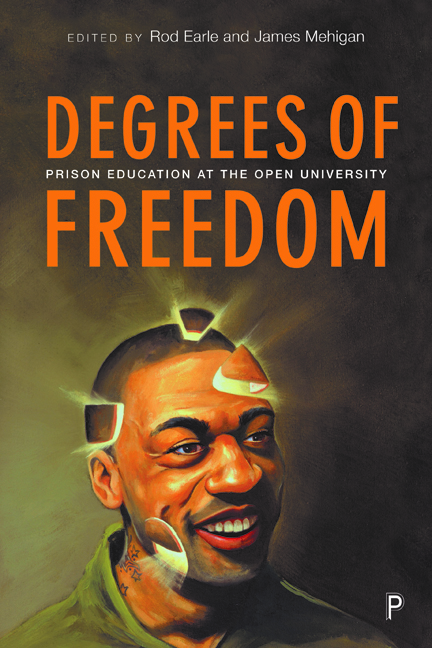Book contents
- Frontmatter
- Dedication
- Contents
- Notes on Contributors
- Acknowledgements
- 1 Openings and Introductions: Education for the Many, Prison for the Few
- 2 From Prisoner to Student
- Vignette 1 Choosing My Journey
- 3 Pioneers and Politics: Open University Journeys in Long Kesh During the Years of Conflict 1972–75
- Vignette 2 Avoiding the Mind-Numbing Vortex of Drivel …
- 4 A University Without Walls
- Vignette 3 Starting a New Chapter
- 5 Open Universities, Close Prisons: Critical Arguments for the Future
- Vignette 4 Out of the Abysmal
- 6 The Light to Fight the Shadows: On Education as Liberation
- 7 From Despair to Hope
- Vignette 5 Making my Commitment
- 8 Straight Up! From HMP to PhD
- 9 From Open University in Prison to Convict Criminology Upon Release: Mind the Gap
- Vignette 6 Message to a Prisoner
- 10 From the School of Hard Knocks to the University of Hard Locks
- 11 Becoming me with The Open University
- Vignette 7 Catching up with Kafka
- 12 From D102 to Paulo Freire: An Irish Journey
- Vignette 8 My Journey, My New Life
- 13 Ex-Prisoners and the Transformative Power of Higher Education
- Vignette 9 Prison Choices: Taking a Degree or Packing Tea?
- 14 What the OU did for me
- Appendix Study with The Open University
- Index
12 - From D102 to Paulo Freire: An Irish Journey
Published online by Cambridge University Press: 11 March 2021
- Frontmatter
- Dedication
- Contents
- Notes on Contributors
- Acknowledgements
- 1 Openings and Introductions: Education for the Many, Prison for the Few
- 2 From Prisoner to Student
- Vignette 1 Choosing My Journey
- 3 Pioneers and Politics: Open University Journeys in Long Kesh During the Years of Conflict 1972–75
- Vignette 2 Avoiding the Mind-Numbing Vortex of Drivel …
- 4 A University Without Walls
- Vignette 3 Starting a New Chapter
- 5 Open Universities, Close Prisons: Critical Arguments for the Future
- Vignette 4 Out of the Abysmal
- 6 The Light to Fight the Shadows: On Education as Liberation
- 7 From Despair to Hope
- Vignette 5 Making my Commitment
- 8 Straight Up! From HMP to PhD
- 9 From Open University in Prison to Convict Criminology Upon Release: Mind the Gap
- Vignette 6 Message to a Prisoner
- 10 From the School of Hard Knocks to the University of Hard Locks
- 11 Becoming me with The Open University
- Vignette 7 Catching up with Kafka
- 12 From D102 to Paulo Freire: An Irish Journey
- Vignette 8 My Journey, My New Life
- 13 Ex-Prisoners and the Transformative Power of Higher Education
- Vignette 9 Prison Choices: Taking a Degree or Packing Tea?
- 14 What the OU did for me
- Appendix Study with The Open University
- Index
Summary
Prologue
I’ve often wondered if many who studied with The Open University (OU) found it a lonely experience – in comparison to those who attended a ‘conventional’ university – working alone at home with only a limited number of engagements with their tutor and/or tutorcounsellor, combined with short group meetings where they had an opportunity to exchange thoughts and opinions on their studies. My experience of studying with the OU was not a lonely one at all; for reasons mostly not associated with the OU but due to my personal circumstances and conditions at the time. I was a political prisoner (Irish Republican Army) in the H-Blocks of the Maze/Long Kesh prison in the North of Ireland. It was because I was a prisoner that I had the opportunity to study with the OU but the motivation to engage in the studies, and the choice of courses I took, must be seen in the broader context of what had gone on in the prison in the previous years, and what happened there subsequently. My academic study with the OU (an experience which was shared with other comrades) was closely integrated with my developing political consciousness and activism, just as the materials from a range of OU courses became part of a wider programme of political education of Irish republican prisoners. The two processes were intimately combined.
Introduction
I began my studies with the OU in 1984. The previous year had been an eventful one in the prison as a mass escape of 38 IRA prisoners had taken place on 25 September and we were still dealing with the fallout from that in terms of the prison authorities introducing tightened security and restricted movement, which had implications for education provision.
But then again, the prison had witnessed many eventful years from when the H-Blocks first opened in September 1976. The ‘Blocks’ as they became commonly known, were built to facilitate a new British government policy of ‘criminalisation’. From 1 March 1976, anyone sentenced for IRA (or loyalist) activities would no longer be regarded as a political prisoner (as had been the case up until then) and would instead be treated as an ordinary criminal prisoner. In essence, this meant that they would be forced to wear prison uniform and do prison work.
- Type
- Chapter
- Information
- Degrees of FreedomPrison Education at The Open University, pp. 179 - 190Publisher: Bristol University PressPrint publication year: 2019



